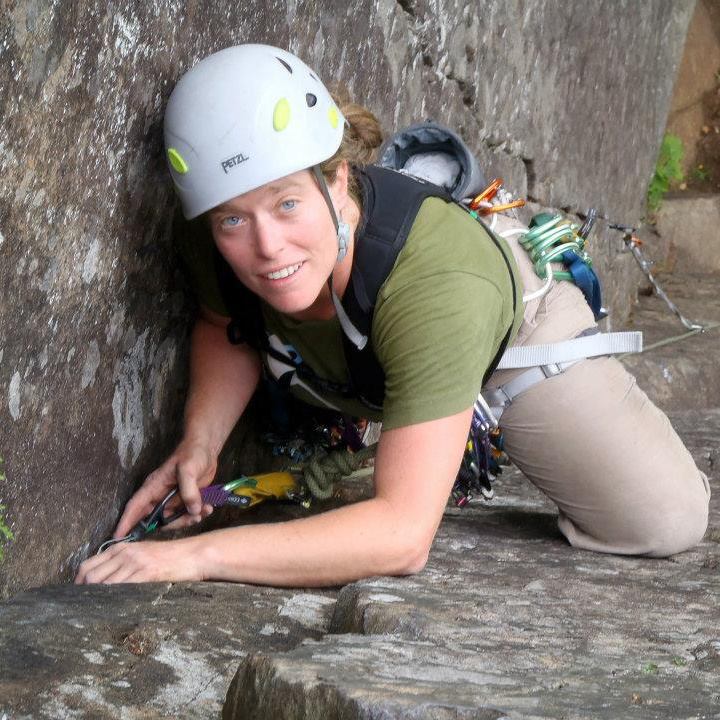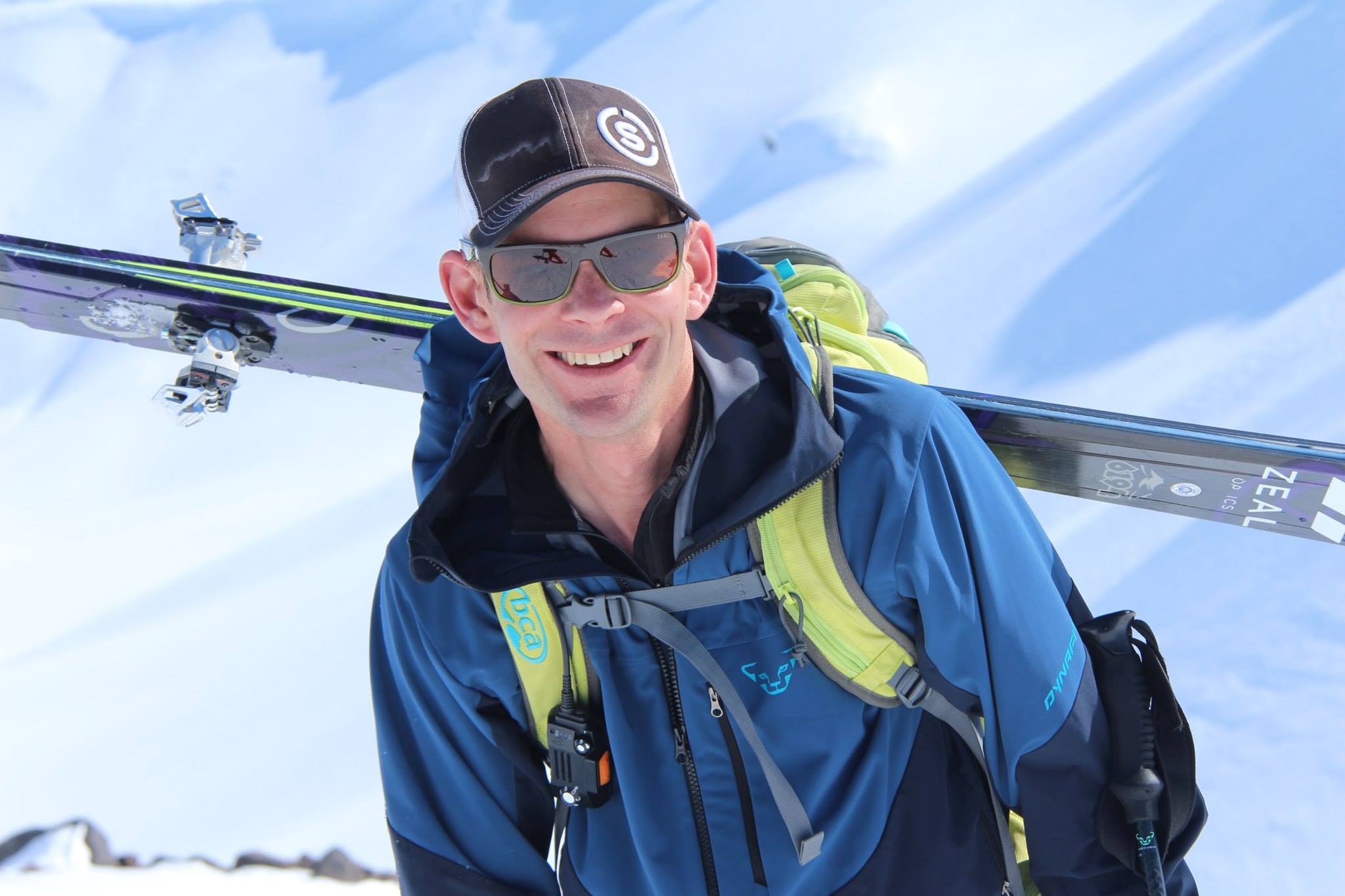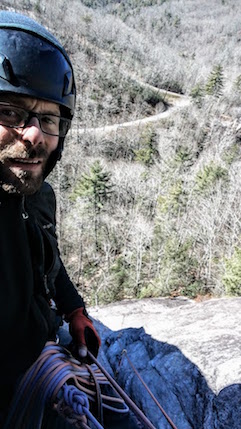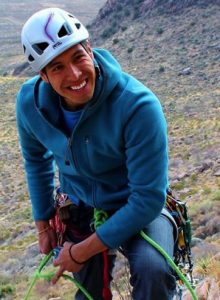
AMGA Ski Guide
 The AMGA Ski and Splitboard Guide certifications are meant for the experienced backcountry skier/rider or ski guide looking to further hone their skills in off-trail and glacial terrain. It is designed for guiding either ski tours or ski ascents/descents, on alpine touring, splitboard or free-heel equipment. Topics covered include: track setting, navigation, efficient 3rd and 4th class travel, short-rope and short pitch techniques, rescues skills, and client care.
The AMGA Ski and Splitboard Guide certifications are meant for the experienced backcountry skier/rider or ski guide looking to further hone their skills in off-trail and glacial terrain. It is designed for guiding either ski tours or ski ascents/descents, on alpine touring, splitboard or free-heel equipment. Topics covered include: track setting, navigation, efficient 3rd and 4th class travel, short-rope and short pitch techniques, rescues skills, and client care.
Students are expected to arrive with a minimum of four years of recreational backcountry skiing/riding experience and an working knowledge of knots, belaying, rappelling, anchors, and basic alpine climbing systems. It is assumed that the students can ascend and descend 4500 vertical feet per day. It is expected that students are physically, mentally, and emotionally prepared for a 10+ days of continuous outdoor activity.
Splitboard Use on Ski Programs
 Starting in 2014, the AMGA will allow Splitboarders to move through the entire Ski Program on their boards, without being tested on skis. Splitboarders will have to demonstrate all the same guide skills as skiers, and their travel mode will have to be via skins. No snowshoes will be allowed. While those who successfully pass the Ski Guide Exam on a Splitboard will become certified AMGA Splitboard Guides through the AMGA, individuals who are pursuing American Mountain Guide/IFMGA Guide certification will not become internationally certified until they pass a one-day movement assessment on skis. This is a requirement of the IFMGA, as the association does not allow certification for Splitboarders at this point in time. Those who demonstrate that they meet the ski standard will be awarded American Mountain Guide/IFMGA Guide certification. Click here for more information about the AMGA Splitboard Guide Certification.
Starting in 2014, the AMGA will allow Splitboarders to move through the entire Ski Program on their boards, without being tested on skis. Splitboarders will have to demonstrate all the same guide skills as skiers, and their travel mode will have to be via skins. No snowshoes will be allowed. While those who successfully pass the Ski Guide Exam on a Splitboard will become certified AMGA Splitboard Guides through the AMGA, individuals who are pursuing American Mountain Guide/IFMGA Guide certification will not become internationally certified until they pass a one-day movement assessment on skis. This is a requirement of the IFMGA, as the association does not allow certification for Splitboarders at this point in time. Those who demonstrate that they meet the ski standard will be awarded American Mountain Guide/IFMGA Guide certification. Click here for more information about the AMGA Splitboard Guide Certification.
To get your Ski and/or Splitboard Guide Certification, you must complete:
- Either the 5 day Alpine Skills Course (ASC) or the 10 day Rock Guide Course (RGC)
- The 10-day Ski Guide Course (SGC) – VIDEO APPLICATION REQUIRED FOR 2020 SGCS
- The 10-day Advanced Ski Guide Course and Aspirant Exam (ASGC/AE)
- The 8-day Ski Guide Exam (SGE)
- Successful completion of an AMGA approved Pro 2, or Level III
- For details on the updated avalanche education framework introduced in the 2017/18 season, please click here.
- Current CPR Certification
- Current Wilderness First Responder (WFR) Certification or higher that meets the Minimum Guidelines and Scope of Practice for a WFR
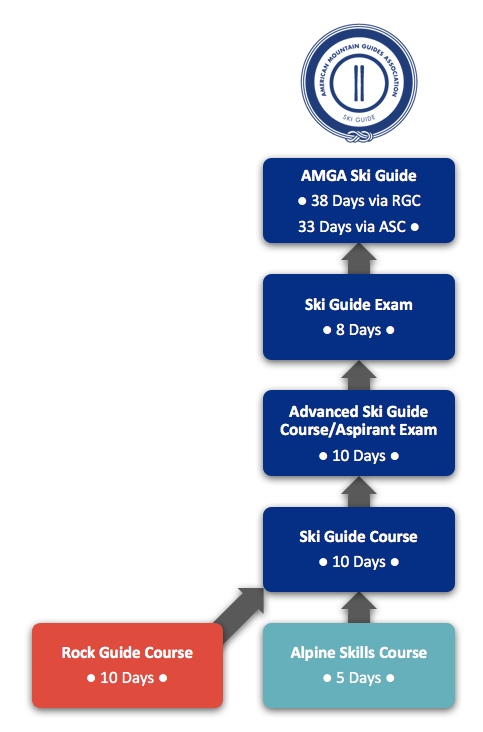
Program Information
Ski Guide Course
The Ski Guide Course (SGC) is designed for skiers and riders who wish to learn the skills and techniques used while guiding multi-day tours in a non-glaciated, yet possible high-mountain backcountry setting. It covers management of 3rd and 4th class terrain, technical ascents and descents, and management of multiple clients and small team rescues. Emphasis is placed on effectively managing risks and maximizing client rewards. Glacier travel, crevasse hazards and sustained technical mountaineering challenges are generally not covered in this course.
Prerequisites:
- Current AMGA member
- Current CPR Certification
- Current Wilderness First Responder (WFR) Certification or higher that meets the Minimum Guidelines and Scope of Practice for a WFR
- Successful completion of an AMGA approved or Pro 1, or Level II
- For details on the updated avalanche education framework introduced in the 2017/18 season, please click here.
- Successful completion of the Alpine Skills Course or Rock Guide Course
- Four years personal ski touring experience, including multi-day tours and peak ascents
- Confidence skiing black and double-black diamond terrain, at the time of the course
- Ability to smoothly link turns in all terrain and conditions in un-groomed backcountry snow
- Ability to ascend and descend on skis an average of 4500' - 6000' + vertical feet per day
- Ability to adjust technique to ski in diverse terrain, including sustained descents of up to 50 degrees
- Experience snow climbing with ice axe and crampons
- Comfortable with self-arrest and belay
- Ability to choose appropriate belay and rappel methods for rock and snow
- Ability to navigate in whiteout conditions
- Proficiency with multiple burial avalanche rescue (ability to consistently locate 3 buried avalanche transceivers in under 10 minutes)
- Experience with winter camping and shelter construction
- Experience with basic short roping and pitching on snow and rock
- Experience with map and compass
- Familiar with LNT practices
- You have completed 20 different ski tours (5 of which are on terrain 40 degrees or steeper, 5 of which are day tours that include at least 4500 vertical feet of ascent and descent, and 5 of which are multi-day tours using huts or ski camping) - this will be documented in your submitted resume with your application.
- You have submitted a movement video showing your skiing/riding abilities meet the prerequisite level required
- Movement video submission is required for SGC applications
- For full details and what to put in your video, please read the SGC Video Submission Document and view:
- Reference Videos
- AMGA SGC MOVEMENT VIDEO | EXAMPLE AND TIPS
- AMGA Splitboard Standard | 2016 Video
- AMGA Ski Standard | 2014 Video (Note: This video demonstrates competent movement skills. Splitboarders should still submit a video in the style of the “AMGA SGC Movement Video)
Format:
The SGC includes indoors and outdoors classroom time, practice sessions, and skiing on a variety of terrain and snow conditions. Recreational backcountry skiing and ski mountaineering skills and judgment are screened as part of the daily activities. The course is designed to introduce some of the recommended methods common to ski mountaineering guiding through sessions and practical application.
Still curious about what to expect on an SGC?
Check out this Ski Guide Course Video from 2016 Mammut Scholarship Recipient, Casey Graham.
Advanced Ski Guide Course & Aspirant Exam
The Advanced Ski Guide Course & Aspirant Exam (ASGC/AE) is designed for skilled skiers and climbers who wish to learn the skills and techniques used while guiding on complex glaciated terrain. This course covers management of 3rd, 4th and possibly 5th class terrain, technical descents, management of multiple clients, and small team rescues. It emphasizes effective risk management while maximizing client rewards.
Prerequisites:
- Current AMGA member
- Current CPR Certification
- Current Wilderness First Responder (WFR) Certification or higher that meets the Minimum Guidelines and Scope of Practice for a WFR
- Successful completion of an AMGA approved Pro 1, or Level III
- For details on the updated avalanche education framework introduced in the 2017/18 season, please click here.
- Successful completion of the Ski Guide Course
- Confidence skiing/riding black and double-black diamond terrain, at the time of the course
- Ability to smoothly link turns in all terrain and conditions in un-groomed backcountry snow
- Ability to ascend and descend on skis an average of 6000 vertical feet per day
- Familiar with LNT practices
- Experience with glacier travel and crevasse rescue
- Ability to navigate in whiteout conditions
- Competence with map and compass
- Mastery of avalanche assessment skills and transceiver use
- Competence with sled rescue skills
- Competence with winter camping and shelter construction
- Competence with basic short roping and pitching on snow and rock
- Led or shared lead on 10 different alpine routes (2 of which include mid 5th class rock, snow, or ice)
- Since completing the Ski Guide Course, 10 different ski descents (5 of which are in complex glaciated terrain)
- Since completing the Ski Guide Course, you have guided/mock-guided at least 10 days in ski mountaineering terrain (documentation must include: dates, location, elevation gain and loss, total horizontal mileage, maximum slope angel and number of clients/mock clients)
Format:
The ASGC/AE is a course and includes instruction, coaching, debriefing, and assessment. The assessment phase in known as the Aspirant Exam. The focus of the course is on principle-based learning, giving you the strategies for problem solving through coaching and practical application in simulated guide/client scenarios. Guiding and instructional skills will be assessed during the Aspirant Exam portion(s) of the course. A final assessment will be based on your overall performance.
Aspirant Exam:
The Aspirant Exam is intended to help determine whether or not your personal skills meet the minimum standards appropriate for guiding in ski mountaineering terrain. In addition, it serves as preparation for the final certification exam. The standard for the Aspirant Exam is at a level appropriate for guiding clients professionally with only indirect supervision. Finally, the essential skills and abilities of the aspirant guide must be comparable to those of a full guide.
Assessment Areas:
- Screening of movement skiing/riding skills as well as movement skills in alpine, snow, and mixed terrain
- Technical skills assessment:
- Transceiver search
- Sled lower
- Guided days assessment, which includes evaluation in the following nine areas: risk management, client care, technical systems, application, terrain assessment, movement skills, mountain sense, professionalism and instructional technique.
Ski Guide Exam
Goals:
The goals of the 8-day Ski Guide Exam (SGE) are to assess and certify ski guides at the AMGA and IFMGA international standards and to further the general education of the students.
Prerequisites:
- Current AMGA member
- Current CPR Certification
- Current Wilderness First Responder (WFR) Certification or higher that meets the Minimum Guidelines and Scope of Practice for a WFR
- Successful completion of an AMGA approved Pro 2, or Level III
- For details on the updated avalanche education framework introduced in the 2017/18 season, please click here.
- Successful completion of the Advanced Ski Guide Course and Aspirant Exam
- Confidence skiing black and double-black diamond terrain, at the time of the exam
- Ability to smoothly link turns in all terrain and conditions in un-groomed backcountry snow
- Familiar with LNT practices
- Mastery of glacier travel and crevasse rescue techniques
- Mastery of all elements of navigation, including the ability to route find on complex glaciated terrain
- Mastery of whiteout navigation, including the use of current technologies and map and compass
- Since completing the ASGC/AE, 10 guided days in ski mountaineering terrain (5 of these days are allowed to be mock-guided)
- Since completing the ASGC/AE, 10 personal ski descents (5 of which are in complex, glaciated terrain and 5 of which are on slopes 45 degrees or steeper)
- Documentation of guided days and descents must include: dates, location, elevation gain and loss, total horizontal mileage, maximum slope angel and number of clients/mock clients
- Students may not take the Ski Guide Exam in the same venue as they took the Advanced Ski Guide Course/AE
During the exam students are expected to carry out guiding assignments given by the examiners. The students serve as guides to the examiners and to the other participants on routes chosen for their complex guiding challenges. While acting as the guide, students are responsible for route planning, client orientation, risk management and normal guiding practices. Route assignments and client profiles are usually given the night before. Students are responsible for obtaining information about the assigned route as well as alternative routes if the original objective proves infeasible.
Expectations:
The exam is conducted on routes chosen by the examiners. Ski mountaineering terrain includes glaciated alpine environments where guides may need to employ extensive short roping techniques, use of the ice axe and crampons, as well as travel on heavily crevassed glaciers. Multi-pitch ice or rock climbing is generally not included in the defined terrain except when necessary to achieve an objective.
Assessment Areas:
- Screening of movement skills in rock, alpine, snow, ice, and mixed terrain
Crevasse Rescue Drill - Guided days assessment, which includes evaluation in the following six areas: risk management, client care, technical systems, terrain assessment, movement skills, and professionalism
Ski Programs Schedule
- Applications open at 5 p.m on Friday, August 4th. (Applications are not first come first serve – reference the links below for more information.)
- For information on how to apply to a program and how applications are reviewed, click here
- For the complete AMGA Course Schedule, click here
- Q: What should I do if I do not have a Ski Video at this time? If you do not yet have a ski video, we suggest that you keep an eye on program openings later in the season and apply/upload your video when you have it. In 2020 and 2021 we had many students create mid-season videos and offered them spaces on programs with openings. You cannot gain acceptance into an SGC without a movement video.
- Tuition prices are still being finalized. The exact price will be listed before applications open.
| Program Type | Code | Location | State | Dates | Tuition | Status | Apply |
|---|---|---|---|---|---|---|---|
| Advanced Ski Guide Course/AE | S17 ASGC 24 | Cascades | Washington | 5/2/24 - 5/11/24 | $3675.00 | Waitlist | Waitlist |
| Ski Guide Exam | S16 SGE 24 | Cascades | Washington | 4/28/24 - 5/6/24 | $3325.00 | Waitlist | Waitlist |
| Ski Guide Exam | S18 SGE 24 | Cascades | Washington | 5/14/24 - 5/22/24 | $3325.00 | Waitlist | Waitlist |
Course Director: Ian Nicholson
Instructor: Mike Soucy
Please note, program tuition does not include food, lodging, transportation, equipment, or any other associated program costs unless otherwise noted. For ski programs, tuition does include mechanized ski access and huts/yurts IF used.
· Cascades ASGCs include a built in travel or rest day. Program may go to multiple venues including NCNP, Mt. Baker, or Snoqualmie Pass depending on weather and conditions.
· It is strongly recommended that you purchase Trip Insurance to protect your tuition investment and other associated costs with your program.
APPLICATION DEADLINE: SEPTEMBER 10, 2023
Photo by Josh Jespersen
Course Director: Paul Rachele
Instructor: Emilie Drinkwater
Please note, program tuition does not include food, lodging, transportation, equipment, or any other associated program costs unless otherwise noted. For ski programs, tuition does include mechanized ski access and huts/yurts IF used.
· Cascades SGEs are 9 days in length and include a built in travel or rest day. Program may go to multiple venues including NCNP, Mt. Baker, or Snoqualmie Pass depending on weather and conditions.
· It is strongly recommended that you purchase Trip Insurance to protect your tuition investment and other associated costs with your program.
APPLICATION DEADLINE: SEPTEMBER 10, 2023
Photo by Josh Jespersen
Please note, program tuition does not include food, lodging, transportation, equipment, or any other associated program costs unless otherwise noted. For ski programs, tuition does include mechanized ski access and huts/yurts IF used.
· Cascades SGEs are 9 days in length and include a built in travel or rest day. Program may go to multiple venues including NCNP, Mt. Baker, or Snoqualmie Pass depending on weather and conditions.
· It is strongly recommended that you purchase Trip Insurance to protect your tuition investment and other associated costs with your program.
APPLICATION DEADLINE: SEPTEMBER 10, 2023
Instructor Team*: Evan Stevens, Emilie Drinkwater
*Staffing is subject to change throughout the year based on AMGA programming needs and instructor availability
Photo by Josh Jespersen
Application and Notification Deadlines
- The application deadline is when your complete application is due.
- The notification deadline is the latest date you will be contacted in regard to your enrollment.
- Applications received after the application deadline will be reviewed on a rolling admission.
Program Dates Application Deadline Notification Deadline Programs with start dates of November 25 - December 31, 2023
(S1 SGC 24 & I11 IIC 23)August 25, 2023 September 1, 2023
Programs with start dates of January 1 - May 31, 2024 September 10, 2023 October 12, 2023 Programs with start dates of June 1 - August 31, 2024 December 1, 2023 December 15, 2023 Programs with start dates of September 1 - November 15, 2024 March 3, 2024 March 28, 2024



